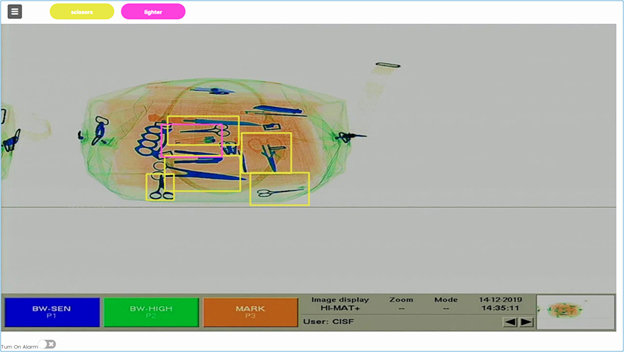
Pranali Chaudhari
Sr. Data Scientist at Dimensionless Technologies
Pandemic brought the travel industry to a standstill last year but with vaccinations being administered around the globe, things are starting to look up and the normalcy would return sooner than later.
Public transport systems, monuments and places of mass gathering are always under serious threat from radical organisations. There have been multiple security incidents due to the failure of personnel at security checkpoints – 9/11, London Bombing or Mumbai blasts are prime examples of this.
Millions of people pass through security checkpoints daily across airports, metro stations, railway stations, prisons, government buildings, stadiums etc. With the pandemic receding and travel picking up the queues have started to get longer at these checkpoints now

The current baggage screening process uses X-ray scanning technology which has not had any upgrades in the past many years. Any security lapse has always been attributed to human screeners, policies and processes focused on better training methods for improving their performance. One such example could be reducing the duration for which a screener looks for threats in the x-ray scan to 20 minutes. But the incidents continue to happen, at least 3 firearms are missed by TSA (transportation security agency).
Manual detection of banned items in x-ray images is an intricate task and is highly prone to human error due to fatigue. Baggage handling and security are major operational challenges, and sometimes contribute to flight delays as well. To mitigate these challenges, a high-performance intelligent baggage scanner system is needed.
 Dimensionless Technologies, an AI company founded by IIT alumnus has developed BaggageAI, using artificial intelligence and data processing technology, to completely overhaul this manual process and automatically detect and locate threat items in x-ray scan images. It is a sophisticated high-performance artificial intelligence (AI) based system for automatic object detection of banned items in baggage through x-ray images. It looks at each image like a human eye, outlines banned objects and sends alerts to the screen. Existing scanners work on manual detection, but this solution automates the process of finding and locating prohibited items in the x-ray image of the scanned baggage.
Dimensionless Technologies, an AI company founded by IIT alumnus has developed BaggageAI, using artificial intelligence and data processing technology, to completely overhaul this manual process and automatically detect and locate threat items in x-ray scan images. It is a sophisticated high-performance artificial intelligence (AI) based system for automatic object detection of banned items in baggage through x-ray images. It looks at each image like a human eye, outlines banned objects and sends alerts to the screen. Existing scanners work on manual detection, but this solution automates the process of finding and locating prohibited items in the x-ray image of the scanned baggage.

BaggageAI has been developed for the most frequent common items, which are contraband like guns, knives, sharp objects, power bank, battery, coconut, lighter, e-cigarette etc.
Solution readily deployable for

The solution has been selected by the Airport Authority of India for pilot and deployment to improve efficiency of security personnel. The pilot run of the solution was successfully conducted at Pune International airport last year and is being put into other airports like Ahmedabad International airport and Delhi International airport. Metro Corporations like DMRC and Mumbai metro are also trying out the solution and the pilot run is scheduled at a couple of metro stations in March.
BaggageAI is a very fast solution that can process up to 3 images per second or up to 180 bags/ minute. This will greatly reduce the time taken at security checkpoints and make it highly convenient to the passengers. It helps detect threats with high accuracy and efficiency, and reduces false alarms, saving invaluable time.
High throughput helps airports handle more passengers and flights per day, resulting in higher revenues and profits. This boosts passenger security significantly by removing human errors in the baggage screening process. It can be effectively deployed at places with high passenger traffic such as airports, metros, malls and railway stations where there is a security risk.

Another amazing benefit of the solution lies in the fact that it can get integrated to any existing x-ray baggage scanner system. This greatly enhances the possibility of upgrading all existing machines and improving the security checkpoints to the next level.
“Human screeners are expected to be correct 100% of the time – which is an impossible task. That’s why we have brought machines into play to ensure the stress on screeners reduces significantly and the process is automated. It will go a long way in enhancing security and customer experience across the globe. With central monitoring of the baggages through a combination of human and AI can significantly reduce operational cost across various application areas,” explained Kushagra and Himanshu, the founders of the organisation.
